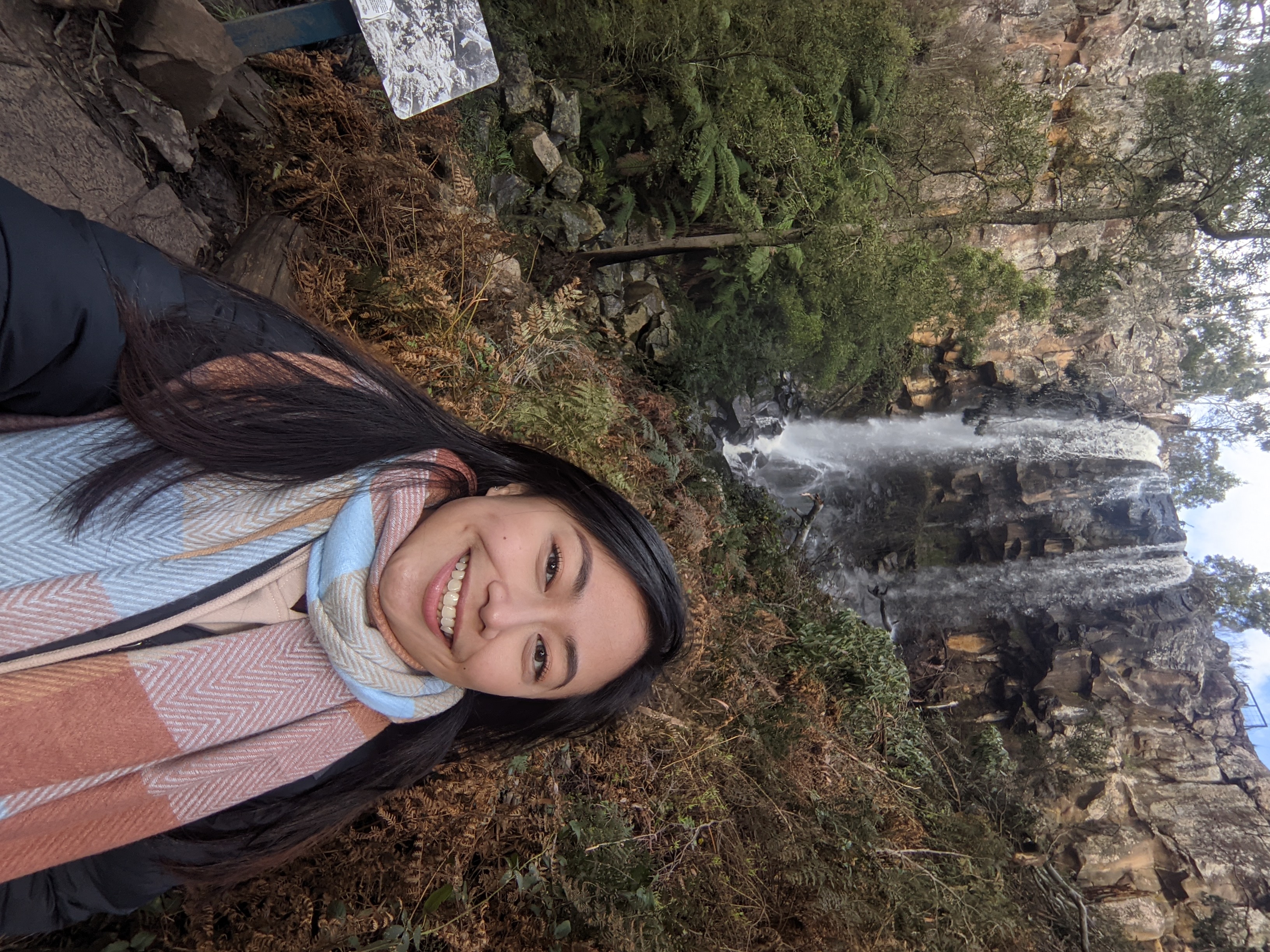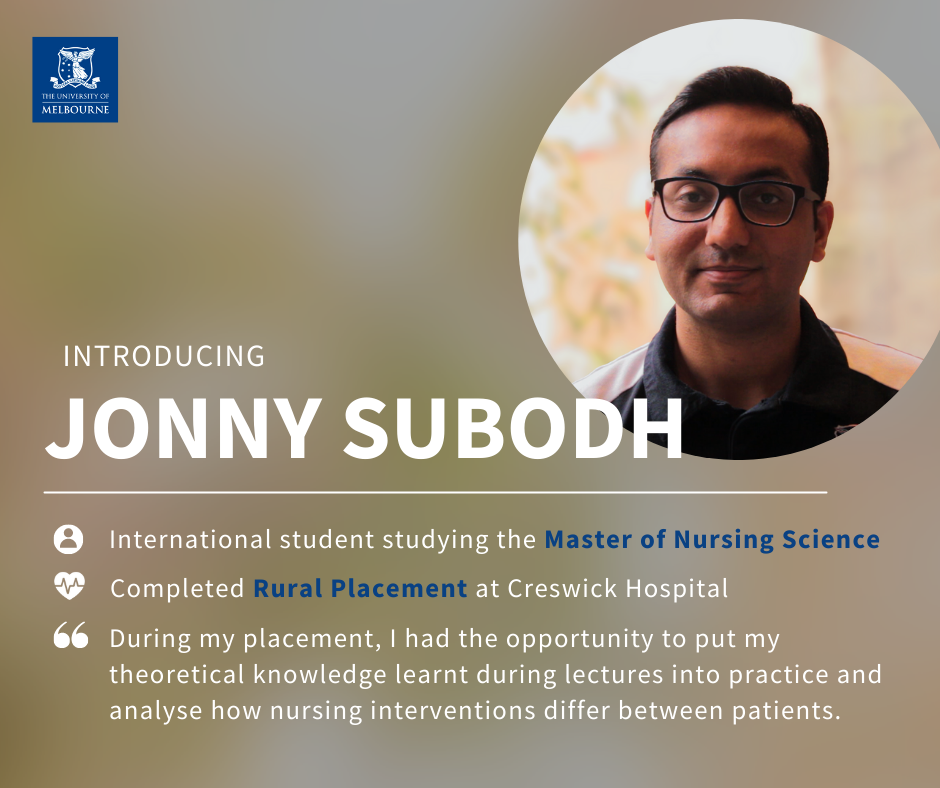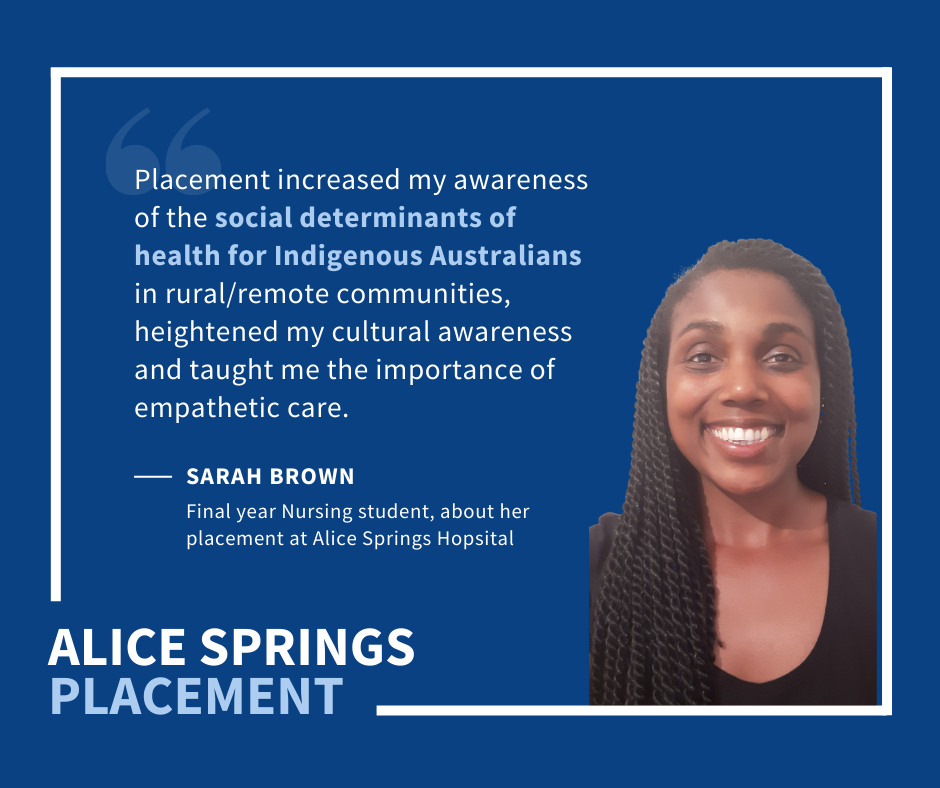Student Testimonials
Below is a compilation of testimonials from students of various MDHS disciplines. We hope this provides you with greater insight into clinical placement experiences offered by the University of Melbourne.
Sarah Jackson
Hear from Sarah about her 6 week rural placement at Neerim South Medical Centre, which she refers to as her "most memorable placement experience."
Christie Yung
Here, Christie discusses her 4 week overseas placement at the Taipei Veterans General Hospital, which provided her with unique exposure to a medical system outside of Australia.
Nicole Milanko
Hi, my name is Nicole Milanko. I am completing my 4th and final year of the Doctor of Medicine.
 Where have you completed your clinical placements?
Where have you completed your clinical placements?
As a rural student, I have been to several hospitals, including Bendigo Health, Northeast Health Wangaratta, Goulburn Valley Health Shepparton, Mt Beauty Medical Centre and Alpine Health in the Alpine region near Falls Creek and Mt Hotham. Currently I am back in Wangaratta at Northeast Health for the next 12 weeks.
Can you provide us an insight into what your daily tasks during placement were?
My cohort is in a unique position as our curriculum was changed mid last year to accommodate for COVID-19 and changes to scheduled placements. Usually in our final year we complete a research project, however this was completed last year in an online format to allow for increased online learning and reduced in-person placements. This year we are completing 2020 placements in Women’s Health, Paediatrics, Aged Care and Mental Health. These days range anywhere from a couple of hours to 12 hour days. I do anything and everything from administrative work and minor procedures on the ward, to seeing patients in clinic and assisting in theatre.
What is your favourite part of placement?
As a final year student, we are very self-directed in our learning. I enjoy this independence and the stimulating environment of placement. Being surrounded by driven, like-minded individuals is very motivating and fulfilling.
What are some things you have learned as a result of placement?
 Where do I begin! Placement is where we learn clinical reasoning, stepping outside the textbook to apply our theoretical knowledge practically. We learn to practice with empathy, deciphering what truly matters as clinicians and what is important for our patients. It is where I have developed some of the most fundamental characteristics of medical practice; communication, listening and approaching challenging situations such as delivering bad news.
Where do I begin! Placement is where we learn clinical reasoning, stepping outside the textbook to apply our theoretical knowledge practically. We learn to practice with empathy, deciphering what truly matters as clinicians and what is important for our patients. It is where I have developed some of the most fundamental characteristics of medical practice; communication, listening and approaching challenging situations such as delivering bad news.
What advice would you give to any students starting placement?
Leaving family and friends, regardless of whether you are going rural or not, can be challenging. However, getting out of your comfort zone and trying new things is the best way to learn about yourself and the amazing things you are capable of achieving. The more you say yes to experiencing new challenges, the more opportunities will come your way! Keep in mind, it is incredibly important to be kind to yourself. You do not have to face challenges alone. Recognise when you need help and always reach out for assistance.
Can you explain how confident this placement has made you to go out into the workforce?
Without placement, I would be lost. I have had some incredible opportunities in the places I have been. At times, I have been the most, or second most, qualified person in the room and so I really felt like I made valuable contributions to patient’s healthcare. My supervisors have always made me feel a part of the team and were never far away. Critically, they always offered extensive support, enabling me to practice safe and effective medicine.
Martin Mitrevski
Hear from Martin about his placement at Forensic Intervention Services, where he received the opportunity to deliver treatment to service users (previous offenders).
Rebecca Shao
In this video, Rebecca discusses her placement at Western Health, which provided her with valuable exposure to working in a hospital environment.
Denise Tan
Hi - I'm a second year of Master of Clinical Psychology Student who completed a 50 day placement at Paediatric Consultation & Liaison Psychiatry at Monash Children’s Hospital.
 My role consisted largely of primary and secondary consultation to medical professionals within the hospital regarding patients who present with co-morbid mental health difficulties. On the daily basis, I would attend team meetings to discuss and handover information about patients, conduct assessments and reviews depending on referrals received (e.g., risk assessment, diagnostic clarification, initial assessment), and liaise with relevant health professionals caring for patients I have seen. Documentation and note-writing would always follow.
My role consisted largely of primary and secondary consultation to medical professionals within the hospital regarding patients who present with co-morbid mental health difficulties. On the daily basis, I would attend team meetings to discuss and handover information about patients, conduct assessments and reviews depending on referrals received (e.g., risk assessment, diagnostic clarification, initial assessment), and liaise with relevant health professionals caring for patients I have seen. Documentation and note-writing would always follow.
What was your favourite part of placement?
Great exposure to a range of acute psychiatric difficulties that are common to the emergency department (e.g., functional neurological disorder, eating disorders like anorexia nervosa, self-harm/ suicide attempts). I also loved how supportive my team was in allowing me to observe and gradually build independence.
What are some things you learnt as a result of placement?
I have learnt the importance of engaging parents and the family system in the care of a young person, how to engage young people in an acute setting where distress levels are high, and to manage my anxiety around making risk-related decisions. I have also learnt what it is like working in a transdisciplinary team within an inpatient medical setting and how to navigate the relational nuances between professionals.
Can you explain how confident this placement has made you to go out into the workforce?
This placement has fostered professional confidence in me to work in a similar acute setting, teaching me both soft and hard skills that can be translated into other mental health work.
What additional opportunities have you received due to placement?
I was able to build relationships with staff members within Monash Health and had insightful conversations around what opportunities the organisation can offer.
Ashley Zammit
Ashley recounts her time during an interstate placement at Tennant Creek Hospital. In this video, she provides valuable insight into her experience working within a remote community in Central Australia.
Eleanor Davey
Hear from Eleanor about her placement at the Royal Melbourne Hospital, which provided her with the skill set required to navigate priorities during busy hospital shifts.
Jonny Subodh

What was your favourite part of placement?
My favourite part of this placement was the unique opportunity I had to organise a community clinic that provided influenza shots. This allowed me to connect with the rural community, where they were grateful that I travelled from the city to support them.
What have you learned as a result of placement?
Placement improved my clinical skills, as I learnt how to provide person-centred care to people of different cultural backgrounds. Moreover, I developed my ability to handle stressful situations, as I assisted with treatment of a patient undergoing an anaphylactic reaction.
What advice would you give to students starting placement?
Often students on placement are reluctant to speak up. Nevertheless, I would encourage anyone on their first placement to make the most of this opportunity and ask questions whenever in doubt. In my experience, placement co-ordinators appreciate confidence and the initiative to ask questions; therefore, I recommend a similar approach.
What additional opportunities have you received as a result of placement?
As I demonstrated a positive attitude towards learning, my co-ordinator was happy to be my referee and encouraged me to apply for graduate opportunities at Creswick Hospital.
Sarah Brown

Can you provide us an insight into your day-to-day tasks on placement?
My placement was in the Emergency Department (ED), so each day presented its own challenges. Therefore, as a nursing student, I had to learn very quickly how to assess patients for deterioration, as well as assist members of the multidisciplinary team with medical tests, medications, interpretation of results and minor procedures.
Another facet which added richness to my experience was the patient population of predominantly Indigenous Australians. There were many cultural and socioeconomic implications which had to be taken into account when providing care; these factors were essential for understanding the patient's presentation and their family/community dynamics.
What was your favourite part of placement?
Just being in Alice Springs, especially as someone who is interested in Rural and Remote Nursing. The sense of community was absolutely amazing and I enjoyed the “small town” feel that it had. I also enjoyed the weekend trips other students and I would take which really allowed for a great sense of connectedness to the land and environment. For me, this really helped me to gain a glimpse of the importance of living and being on ancestral land for Indigenous Australians. The experience added to my understanding of challenges and the social determinants of health associated with living in a desert environment.
What are some things you have learnt as a result of placement?
With a diverse patient demographic and desert environment, I was exposed to new medical ailment, languages and lifestyles which all challenged and refined my critical thinking, communication and interpersonal skills. Through collaboration with a multidisciplinary team, I had learned how to communicate with non-English speaking patients, monitor for signs of deterioration, educate patients on basic hygiene and provide companionship. As a result, patients received early intervention and treatment which improved their condition.
What advice would you give to students starting placement?
Most likely you will go into placement feeling unprepared, underskilled and insecure – and that’s normal. I would advise all students to acknowledge that you won’t know everything - and that is OK. Therefore, take full advantage of everything your placement has to offer, even if the ward does not fulfill all your expectations or the staff are pressed for time. Ensure that you ask questions, make yourself known, get involved, be open to the experience and don’t be afraid to have banter with fellow students, staff and patients.
Can you explain how confident this placement has made you to go out into the workforce?
This placement has also made me a more culturally sensitive and compassionate nurse. This placement greatly taught me the importance of advocating for my patients and just being present with them. I strongly believe that in nursing it is quintessential to be clinically confident and capable, but it’s even more important to care for and about our patients. For us to be great clinicians we have to meet people where they are so they feel comfortable around us: therefore allowing us to provide the care they require.
What additional opportunities have you received due to placement?
From this experience I have gained one of the best ANSAT scores I have ever received and gained multiple references which have greatly enriched my applications for Graduate Nursing programs.
Alisha Gudkar
Hear from Alisha about her placement at Country Hearing Care in Mildura, which provided the opportunity to offer hearing aid services for clients living in a close-knit rural community.
Taylor Jenkin
Taylor discusses her 12 week placement at the Cognitive Disorders Outpatient Clinic in Austin Hospital. Due to this placement, she received an offer for further academic and research positions.
Robert Thomson
In this video, Robert discusses his placement experience at Griefline. This provided him with the opportunity to deliver services to a variety of clients, such as anonymous callers via a counselling helpline and individuals referred by the police.
Natasha Olissoff
Hi, I’m Natasha. I’m in my final year of the Master of Social Work degree at the University of Melbourne.
I’m completing my final placement in the Northern Territory. My placement is with the Department of Territory, Families, Housing and Community and I am based in Tennant Creek doing 400 hours of child protection work.
Can you provide us an insight into what your day-to-day tasks were while on placement?
My placement is an interesting fast-paced environment, as reports come in and we must act immediately. When cases come in, my team collectively maps them, discuss our initial thoughts, and rates the safety of the case.
Other examples of day to day activities include home visits and going out on bush trips. Essentially, all our tasks allow us to explore how we can work with families to strengthen their supports and make sure the children that are living with them are safe.
What are some things you have learned as a result of placement?
I’ve learnt so much because of this placement! Amongst many new experiences, I’ve developed my cultural competency and gained insights into how to be respectful of people from different backgrounds. This placement has really challenged me to learn how to express myself in a way that everyone can understand. Upon communication breakdown, I’ve learnt to persevere and have discovered different methods to convey a message.
My favourite part was going on bush trips. This is a great opportunity, as I learnt so much from visiting the range of communities here. These smaller communities are very willing to work with us, which was pleasantly unexpected. In particular, I enjoyed observing the strong sense of culture within these communities and the way it lives on throughout generations.
What advice would you give to students starting placement?
Placement is a wonderful opportunity be a part of an inclusive, understanding team, so don’t be afraid to ask for different responsibilities, talk about things you want to learn, as well as tasks you may be uncomfortable with.
The Social Work Placement Team provides you with various opportunities to understand how to navigate placement; so, if you have any concerns or questions, do voice them to your supervisor, task educator or even your university tutor/student group. Through these networks, I’ve never felt lonely or unsupported during my remote placement.
How confident has this placement made you to go out into the workforce?
This placement has made me very confident to go into the workforce, as I now have a better understanding of what is expected of me during employment. I’ve gotten to work with a variety of different people, which has helped me determine what my style is, as well as the tasks that I feel comfortable doing in practice.
Placement is a wonderful way to make mistakes and ask questions early; as a placement student, people are understanding and willing to provide guidance. Overall, placement has made me more confident to reach out to different services, social workers and communities.
For me, I never thought that I would like child protection, but I’m actually looking at coming back to work here. So, I’d like to reiterate my advice to give everything a shot and have an open mind.